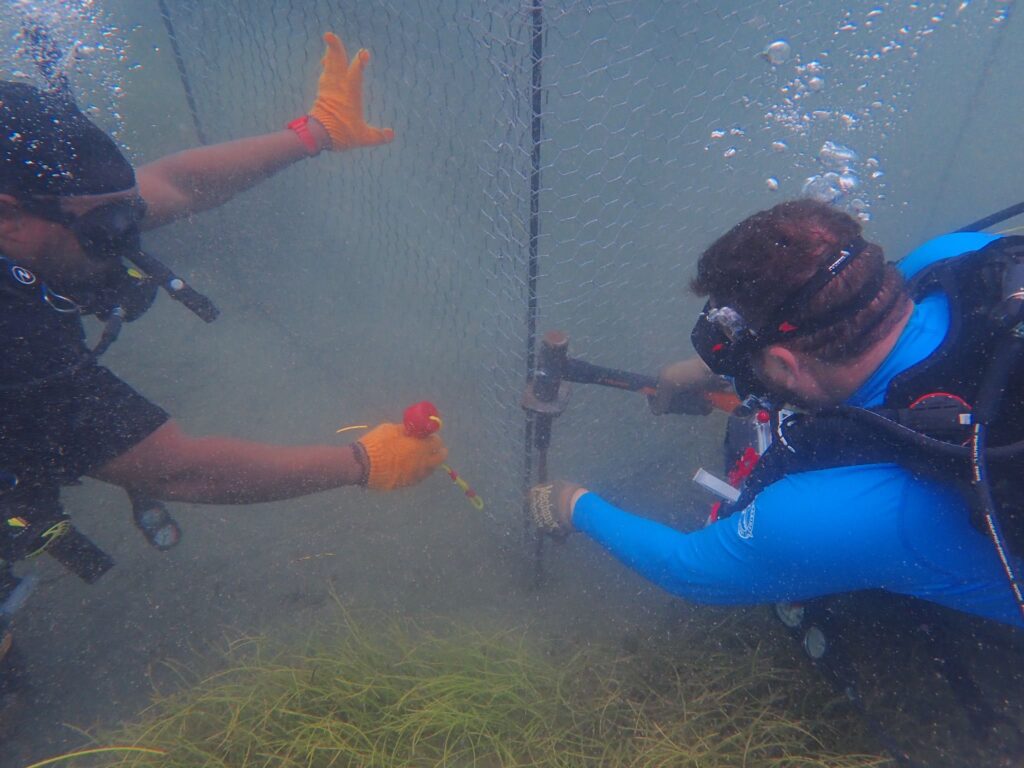In a pioneering move for marine conservation and economic sustainability, the Department of Marine Resources of St. Kitts and Nevis partnered with the Caribbean Aquatic Restoration Effort St. Kitts and Nevis (C.A.R.E.SKN) to host a dynamic, week-long training focused on farming the native Caribbean King Crab.
This initiative marks a transformative step in protecting the Federation’s fragile coral reef ecosystems while creating innovative livelihood opportunities for local fishers. The training which wrapped up on Friday, follows a strategic meeting held on Thursday, May 8, 2025, led by CARESKN Co-Directors Valerie Gregoire and Rudell Williams.
Gregoire explained the significance of the species, stating, “The reason why we chose the King crab is because it’s an innovative and new way of supporting coral restoration and also because it has economic value, where we could also bring something else, a livelihood for fishers who are interested. We’re not importing anything — these are native Caribbean king crabs that we already have here. The idea is to produce the crab farm until they reach a certain size and then introduce them back into the reef.”
The Caribbean King Crab is a powerful ally in reef conservation. By feeding on harmful algae that suffocate corals, these crustaceans naturally contribute to reef health and biodiversity. Their role as “reef cleaners” positions them as both an ecological asset and a sustainable resource.
Co-Director and Marine biologist Rudell Williams emphasized the broader social and economic benefits of the initiative.
He said, “We are accustomed to fish. We are accustomed to shrimp, but nobody ever saw king crab locally on their plate and so this gives the fisher folk not only fisher folk, but a person also who might be interested in venturing into this type of field as a possible career to open up the possibilities in our local communities in St. Kitts and Nevis for person to be able to farm, learn how to scuba dive and go out there on the reef, do monitoring and bring back that crab that was farmed right here in our ocean. Apart from grazing, it’s also for sustainable fishing and so we have that alternative for our fisher folk. If they can’t catch fish, at least they have the king crab.”
Williams also highlighted the potential for restaurants and the tourism sector to embrace the king crab as a locally sourced delicacy, further boosting economic growth.
Meanwhile, Alvin Heyliger, Aquaculture Officer at the Department of Marine Resources, offered his perspective on the training.
The biologist stated, “I find this initiative to be quite timely, and it also fits into the overarching work program for the Aquaculture unit for the development, as one of the main goals for [our department] is to enhance the livelihood of fishers. This program will also be beneficial to us at the Department of Marine Resources as it further enhances our skills in terms of animal husbandry when it comes to aquatic organisms. It also will enable us to further enhance the environment by the farming of the native Caribbean king crab.”
The intensive training was facilitated byDr. Jason Spadaro of Mote Marine Laboratory & Aquarium in Sarasota, Florida — a leading expert in marine restoration. As part of the program, participants learned to construct and manage cages for various stages of the crab’s development, including hatching, juvenile, and adult crabs. The initial goal is to install two adult cages and eight juvenile cagesinTamarind Cove, Nevis, and the South Peninsula, St. Kitts, with the crabs expected to reach harvest maturity after completing their one-year life cycle.
This initiative is designed to support three major goals. First, it contributes to the rehabilitation of coral reefs by reintroducing algae-grazing crabs that help reduce reef degradation. Second, it promotes sustainable fishing practices by offering crab farming as a viable alternative for fishers, particularly during off-seasons or when fish stocks are low. Lastly, it provides alternative livelihoods by equipping local communities with valuable skills in aquaculture, reef monitoring, and sustainable seafood production.
The project is supported by several key partners, including UNOPS, UNDP, the GEF Small Grants Programme, and PROCARIBE+, each playing a vital role in bringing this innovative training to life.
A second training session is set to take place in November 2025, offering even more individuals the opportunity to engage with this growing new sector. Persons interested in participating in the second in a series of King crab farmer training are encouraged to call +18696609415 or email info.careskn@gmail.com.



